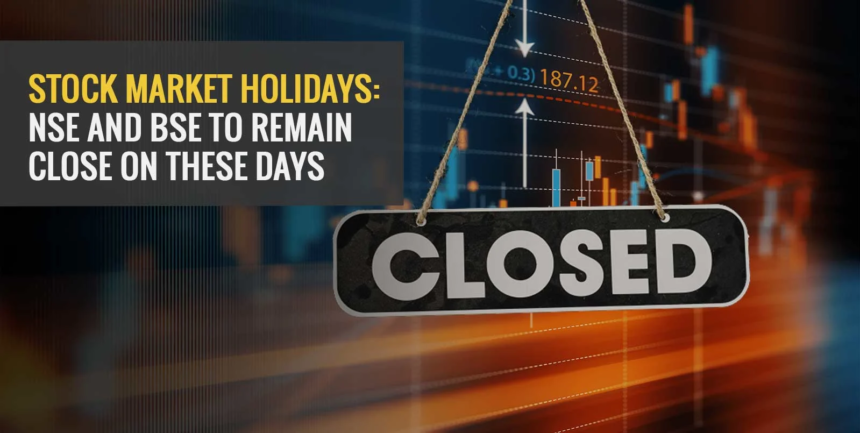If you’ve been keeping an eye on the stock market, you may have noticed that there are specific days when trading takes a pause. Wondering if NSE holidays are in play on Guru Nanak Jayanti? Let’s break it down. On Friday, November 15, both the National Stock Exchange (NSE) and the Bombay Stock Exchange (BSE) will be closed in observance of this significant occasion. This means no trading on stocks, equity derivatives, or even securities lending and borrowing for the day. So, what does this mean for investors and traders? Let’s dive into all the details!
Why are Markets Closed on Guru Nanak Jayanti?
Guru Nanak Jayanti, also known as Gurpurab, is a major festival celebrated by Sikhs worldwide. This religious holiday marks the birth of Guru Nanak, the first Sikh Guru. It’s a day of reflection, prayer, and celebration, and as with many major festivals in India, it’s a reason for stock exchanges to call it a day. The exchanges close to respect the occasion, allowing traders and investors to focus on the celebrations and observe the day of religious importance.
When Will the Markets Open Again?
After the holiday on November 15, regular trading will resume on Monday, November 18. So, if you’re planning to make moves in the stock market, don’t forget to mark your calendar for the next trading session!
Other Stock Market Holidays Coming Up
While Guru Nanak Jayanti may be the focus for now, there are other key holidays you should keep in mind. The NSE holidays 2024 list includes some important dates when the market will remain closed for various reasons:
- November 20, 2024: The markets will be closed for the Maharashtra Assembly Elections.
- December 25, 2024: Both the NSE and BSE will observe a holiday for Christmas.
These holidays are part of the market holidays 2024 schedule, and it’s always a good idea to keep an eye on them to avoid any surprises.
How Do Market Holidays Affect Trading?
Holidays may cause a bit of a pause in the usual trading action, but they’re an integral part of the financial calendar. They give traders and investors a chance to rest, reset, and reassess their positions. However, keep in mind that market closures can also lead to lower liquidity on certain days, which can affect stock prices and trading volume when the market reopens.
Looking Back: A Flashback to the Laxmi Pujan Holiday
Just a few weeks ago, on November 1, the Indian stock exchanges observed a holiday for Laxmi Pujan. While trading was halted for most of the day, a special one-hour trading window was set up in the evening. This is a good example of how exchanges sometimes adapt to unique situations, allowing for a bit of flexibility in the trading schedule.
The State of the Stock Market on November 15
So, what happened with the stock market on Thursday, November 14, the day before the holiday? Well, it wasn’t a great day for the equity indices. Both the Nifty 50 and the Sensex ended the day in the red. The Nifty 50 closed down by 0.11% at 23,532.70, and the Sensex dipped by 0.14% to 77,580. It was a bit of a sluggish day for the Indian stock market.
But There’s Some Positive News
Despite the broader market downturn, not all segments were in the red. The Bank Nifty ended the day on a positive note, closing up by 91 points (or 0.18%) at 50,179.55. The Nifty Midcap 100 also showed resilience, closing 242 points (or 0.45%) higher at 54,043. This just goes to show that while the overall market may be down, certain sectors and indices can still outperform.
What’s Next for Investors?
Looking ahead, the stock market will reopen on November 18, and traders will be eager to see how the indices fare post-holiday. As always, it’s crucial to stay informed about NSE holidays and other scheduled market closures so you can plan your trades accordingly. Whether you’re an experienced investor or just starting out, understanding the rhythm of market holidays can give you an edge in making well-timed investment decisions.
Why Keeping Track of NSE Holidays Is Important
If you’re actively trading or investing in Indian equities, it’s essential to know when the stock exchanges will be closed. NSE holidays can have a significant impact on market activity, liquidity, and the overall flow of trading. Knowing when the market is closed can help you make strategic decisions about when to buy, sell, or hold your positions.
The Bottom Line: Don’t Forget to Plan Ahead!
Stock market holidays are part of the trading landscape, and they’re here to stay. With NSE holidays 2024 already marked on the calendar, it’s a good idea to keep an eye on upcoming closures. Whether it’s Guru Nanak Jayanti, the Maharashtra Assembly Elections, or Christmas, knowing when the market will be closed can help you make better decisions. So, mark those dates, plan your trades accordingly, and enjoy the holiday season without worrying about missing out on market opportunities.
Conclusion
In conclusion, NSE holidays play a crucial role in shaping the trading calendar and ensuring a balanced approach to investing. Whether it’s a religious holiday like Guru Nanak Jayanti or a political event like the Maharashtra Assembly elections, these closures are part of the broader rhythm of the financial year. Always stay updated on the market holidays 2024 to plan your trading strategy better and avoid any last-minute surprises.










